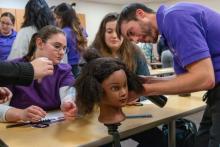Story by Rebecca Ingle
Occupational therapists (OT) help clients return to daily activities to help them feel like themselves again. One crucial way OTs do this is by understanding each client’s unique wants and needs.
Dr. Shanese Higgins is a professor and the chair of the Occupational Therapy Doctoral (OTD) Program at Kettering College. She held an in-class culture lab where students could “explore hair texture and hair coverings as an occupation of importance that they must address in OT practice to ensure culturally responsive care.”
Students used a variety of manikin heads with different hair textures, like a male manikin with a beard and a manikin with a hair covering. Each student received a handout that explained different hair types along with which products and tools to use on them.
Dr. Higgins told the class, “The reality is that the field of OT consists mostly of white women. The profession needs to do better. But the reality is the majority of practitioners do not have experience addressing different textured hair, even within their own communities.
“When you walk into a hospital room, and you want to work on hair washing, and the client tells you they’re not going to do it, it doesn’t mean they’re being non-compliant. You might not have the products they need, or they might not wash their hair as frequently as an OT might assume. This doesn’t mean poor hygiene. It means different hair textures and styles require different attention, and today I’m going to introduce you to that.”
The lab introduced students to an important but often overlooked aspect of serving clients and understanding their individual needs. Students gained access to information they might not have otherwise considered until confronted by it with a client one day. Dr. Higgins told the students, “Not knowing is not the issue. Not being able to learn is the issue.” By conducting an open, honest discussion with space for questions, Dr. Higgins gave students a chance to learn this vital information they’ll carry into their careers.
Students got their hands on this knowledge by working on the manikins. As the students rotated through the stations, Dr. Higgins said, “This is your safe space. Be respectful of the manikins. Pretend they are actual people. I want you to walk around the room and take the time to feel the textures and use the tools respectfully as well as trying different hair coverings. Get familiar with the different textures and curl patterns and what the considerations are. You don’t have to memorize it, but I’m giving it to you to give you awareness.”
As the OTD students worked together to best serve their diverse clients in the culture lab, Dr. Higgins walked around the room and encouraged the groups. She said, “This is all a part of natural grooming. And if our job is to help clients get back to a more fulfilling life, we have to do this. We have to do it in a culturally responsive and appropriate way.”

